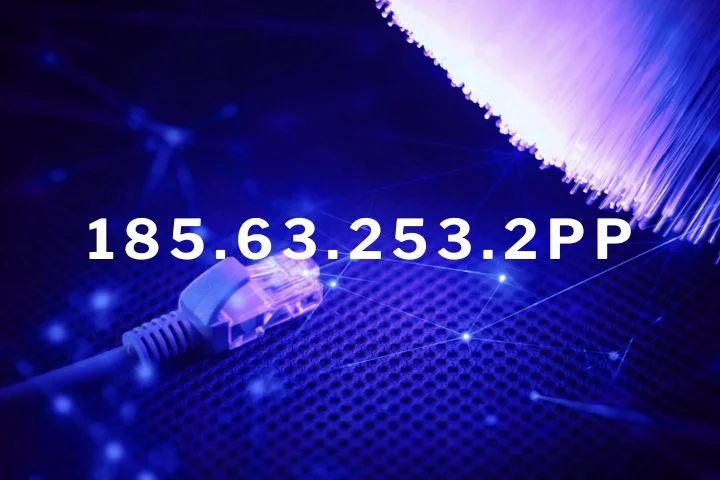Every device that connects to the internet carries an identity — an address that defines where it exists in the vast digital landscape. One such identifier that occasionally raises curiosity is 185.63.253.2pp. At first glance, it may seem like a random string of numbers and letters, but in the world of networking and cybersecurity, even small variations like this can reveal deeper meanings about configuration, purpose, and data flow.
Whether used for hosting, testing, or digital protection, addresses like 185.63.253.2pp are part of what keeps the modern web functional and interconnected. Understanding how such identifiers work helps users and administrators protect systems, manage connections, and maintain safer digital environments.
Decoding the Meaning of 185.63.253.2pp
The label 185.63.253.2pp most likely stems from an IPv4 address — “185.63.253.2” — followed by an additional marker “pp.” In networking, IP addresses act like street addresses for devices, directing information to the correct digital destination. The added characters (“pp”) may represent a custom identifier used by specific systems or companies for internal mapping or security tagging.
While the IP segment follows standard structure, the extra notation could denote anything from a specialized service extension to a backend configuration. In some setups, “pp” might refer to a subserver, proxy process, or an internal routing shortcut. This highlights the flexibility and complexity of digital addressing — it’s not always what it first appears.
Why IP Addresses Like 185.63.253.2pp Matter
Every single action online — sending an email, streaming a video, or visiting a website — depends on IP addresses. They are the silent engines directing billions of data packets to their rightful places each second.
185.63.253.2pp, like other IPs, could serve several crucial roles:
- Routing communication between servers and devices.
- Hosting websites, apps, or private databases.
- Securing user identity through masking or encryption.
- Testing and analysis during system diagnostics or configuration updates.
Essentially, without IP systems like these, the internet would have no structure — no way to recognize who’s talking to whom.
Possible Functions of 185.63.253.2pp
Server and Hosting Infrastructure
Many IPs in this format are tied to web-hosting networks. The address 185.63.253.2pp could point to a hosting server that stores and serves website content to users. Hosting providers often assign such addresses for domain mapping, ensuring smooth and secure delivery of online data.
Proxy and VPN Operations
Some IPs are connected to proxy servers or VPN networks. These systems help users shield their personal identities, enabling secure browsing or access to restricted content. The “pp” tag might even indicate a private proxy configuration or a secondary authentication layer used in VPN routing.
Diagnostic and Testing Uses
IT professionals and network engineers frequently use test addresses to simulate or analyze system behavior. 185.63.253.2pp may be involved in network performance evaluations, firewall testing, or traffic load balancing.
Cybersecurity Monitoring
In security contexts, IPs like this often appear in logs and threat analysis reports. If detected in a system’s incoming or outgoing traffic, cybersecurity experts assess whether it’s legitimate activity or part of a potential intrusion attempt.
The Structure Behind 185.63.253.2pp
Breaking down its structure:
- 185.63.253.2 – A valid IPv4 address composed of four number sets ranging from 0–255.
- pp – A nonstandard suffix or internal extension. This could represent a coded note, private protocol, or unique identifier.
Such customizations are common in corporate or private networks where engineers modify address notation for easier tracking or automation.
This hybrid format doesn’t change how data moves but adds an extra layer of organization for network administrators managing multiple servers or complex configurations.
Network Security and 185.63.253.2pp
From a security perspective, every unfamiliar IP address should be treated with awareness. If 185.63.253.2pp appears frequently in system records, it could mean a connection — intentional or otherwise — between your network and an external host.
Possible scenarios include:
- Unauthorized remote access attempts.
- Malicious traffic from compromised networks.
- Automated bot activity or data scraping.
- Misconfigured systems sending repetitive requests.
To maintain safety, security teams use firewall monitoring tools and intrusion detection systems (IDS) to analyze such addresses. If flagged, they can trace origins, block suspicious activity, and prevent data leakage.
Identifying the Source of an IP
Understanding where an address like 185.63.253.2pp originates is key to network transparency. Online tools such as WHOIS lookup or IP tracer services can reveal:
- The Internet Service Provider (ISP) managing it.
- The geographical location of the server.
- Whether it belongs to a data center, cloud provider, or individual user.
These insights help determine legitimacy. For example, if a supposed local service connects through an overseas IP, administrators can investigate whether the connection is authentic or potentially risky.
How IP Tracking Protects Systems
Modern cybersecurity depends heavily on IP reputation tracking. By analyzing IP behavior — such as login frequency, location patterns, and connection type — systems can detect irregularities early.
185.63.253.2pp, if seen communicating with multiple unrelated systems or showing sudden spikes in traffic, may trigger alerts that help prevent attacks before they spread.
Large organizations maintain IP blacklists or use third-party security databases to automatically block harmful sources. Similarly, whitelisting known and trusted IPs ensures that only verified communications pass through sensitive systems.
The Role of IP Management Tools
To maintain safety and performance, businesses rely on IP management platforms that automate tasks like:
- Tracking active connections.
- Monitoring network traffic.
- Flagging suspicious IP behavior.
- Assigning secure, unique addresses to internal systems.
When addresses like 185.63.253.2pp appear, these tools log their activities, compare them against known patterns, and determine whether they pose a risk.
This type of proactive defense is essential in a digital era where even one misconfigured IP can expose vulnerabilities.
Responsible Use and Awareness
It’s essential to use caution when encountering unfamiliar addresses. Attempting to connect to 185.63.253.2pp or similar IPs without clear authorization can expose devices to hidden threats. Users should always:
- Avoid interacting with random IPs online.
- Keep firewalls and antivirus software active.
- Regularly update their operating systems and routers.
- Use VPNs and secure DNS settings for added privacy.
Safe internet behavior starts with awareness — knowing that every IP connection represents a doorway, and not all doors lead to safe places.
The Broader Impact of 185.63.253.2pp on Cybersecurity
On a global scale, addresses like 185.63.253.2pp illustrate the complexity of digital ecosystems. They connect continents, host businesses, and power cloud technologies — but they also form part of the ongoing battle between innovation and cyber threats.
Cybersecurity professionals analyze millions of such addresses daily to detect malicious networks, track attack origins, and identify coordinated activity. IPs are the fingerprints of the digital world — they reveal patterns that help experts build better protection systems.
The Evolution of IP Systems
As technology advances, traditional IPv4 structures are gradually being replaced by IPv6, offering billions more address possibilities and enhanced security. Yet, legacy addresses like 185.63.253.2pp remain vital to the functioning of many online infrastructures.
Their adaptability, coupled with human creativity, allows systems to evolve without losing compatibility. This blend of old and new ensures seamless communication across generations of digital technology.
Conclusion
The identifier 185.63.253.2pp may look like just another string of digits, but it represents the unseen architecture of the internet — where every address matters, every packet travels with purpose, and every connection shapes global communication.
Whether linked to a hosting provider, a VPN network, or a diagnostic setup, understanding the meaning and implications of such addresses builds awareness of how deeply technology connects our world.
By learning to interpret, monitor, and secure IPs like 185.63.253.2pp, we become better equipped to protect our digital environments and navigate the web safely.
Staying informed, practicing responsible browsing, and embracing cybersecurity habits aren’t just smart choices — they’re necessities in an era where every click travels across invisible highways powered by numbers like these.
FAQs
1. What does 185.63.253.2pp represent?
It likely refers to an IPv4 address with an added custom extension, used by networks or organizations for identification, routing, or testing.
2. Can 185.63.253.2pp be dangerous?
Not inherently, but unknown IPs can sometimes be linked to malicious or unauthorized activity. It’s best to monitor and verify any unfamiliar addresses.
3. How can I find out who owns this IP?
You can use WHOIS lookup or IP tracing tools to check ownership, location, and hosting provider details.
4. Is it safe to visit or ping this IP?
Unless you know the purpose or network behind it, avoid direct interaction. Always prioritize secure, verified connections.
5. Why is IP monitoring important for security?
Tracking IP behavior helps detect intrusions, block suspicious access, and maintain transparency in network communication — a vital part of modern cybersecurity.



